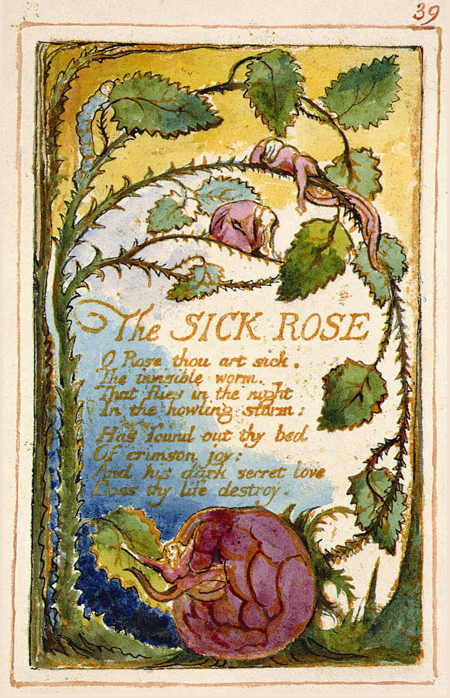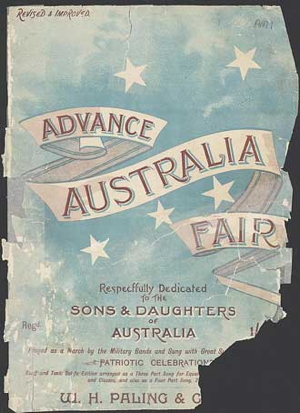
After a long absence from Australia (20 years) it is interesting and instructive to be here on “Australia Day”. The day itself was hot and humid (37.5C) as was the perennial arguments about what “the 26th of January” is or should be all about, when “the 26th of January” should be held, or even whether “the 26th of January” should be celebrated at all. I fall into the latter camp since I am a classic example of a “rootless cosmopolitan”, as well as a “classical liberal”.
I find nearly all “national” anthems objectionable and usually refuse to stand or sing along at public events. This was sometimes hard to do when we were living in the US as most Americans are very “patriotic” (their term – mine is “nationalistic”). A study of several national anthems reveals that they often express very violent and chauvinistic sentiments which liberal people should avoid. I have given lectures over the years on “The Culture of Obedience” in which I discuss the political purpose of these anthems and how similar many of them are. See for example this one.
So what follows are some reflections on being “Girted,” “Skirted”, and “Alerted”.
On Being Girted
I was not living in Australia in 1984 when, as a result of a referendum, the national anthem was changed from “God Save the Queen” to “Advance Australia Fair”. I thought having a folk song known by most Australians would have been a better choice, as it is more of an “anti-anthem” than a true, patriotic song designed to inculcate respect for and obedience to a sovereign power. The song “Walzing Matilda” was after all a song about a vagrant who chose to commit suicide than to let himself be arrested for petty theft.
The version of “God Save the Queen” which we had sing when I was at school had this very objectionable second version, which has since been expunged from popular memory for obvious reasons. It went like this:
O Lord, our God, arise,
Scatter her enemies,
And make them fall.
Confound their politics,
Frustrate their knavish tricks,
On Thee our hopes we fix,
God save us all.`
Back in the 1960s cinemas would play the national anthem and we were expected to stand while it was played. My first overt political act was to refuse to stand when the anthem was played, which sometimes incurred the wrath of patriotic old ladies who were sitting behind me in the theatre and who would wave their handbags about in a threatening manner.
In early January the Prime Minister of Australia, Scott Morrison, unilaterally changed one of the words in the anthem to try to appease the critics – we were no longer “young” but had become overnight “one”. This seemed rather odd and high-handed in a supposed democracy, so I thought it was now time to read the Australian national anthem from beginning to end to see what the fuss was about. The following words (the original not (politically) corrected lyrics) can be found on Wikipedia:
Australia’s sons, let us rejoice,
For we are young and free;
We’ve golden soil and wealth for toil,
Our home is girt by sea;
Our land abounds in nature’s gifts
Of beauty rich and rare;
In history’s page, let every stage
Advance Australia fair.
In joyful strains let us sing,
Advance, Australia fair.
When gallant Cook from Albion sail’d,
To trace wide oceans o’er,
True British courage bore him on,
Til he landed on our shore.
Then here he raised Old England’s flag,
The standard of the brave;
“With all her faults we love her still”
“ Britannia rules the wave.”
In joyful strains then let us sing,
Advance, Australia fair.
While other nations of the globe
Behold us from afar,
We’ll rise to high renown and shine
Like our glorious southern star;
From England soil and Fatherland,
Scotia and Erin fair,
Let all combine with heart and hand
To advance Australia fair.
In joyful strains then let us sing
Advance, Australia fair.
Should foreign foe e’er sight our coast,
Or dare a foot to land,
We’ll rouse to arms like sires of yore,
To guard our native strand;
Britannia then shall surely know,
Though oceans roll between,
Her sons in fair Australia’s land
Still keep their courage green.
In joyful strains then let us sing
Advance Australia fair.
As far as national anthems go, this would have to rank pretty low down the list because of its stilted language, unimaginative lyrics, and chauvinistic national sentiments. In other words, it is not an anthem I would bother to stand up for.
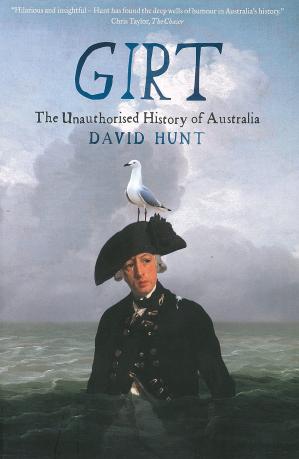
Satirists like David Hunt have seized on one very stilted expression for his book on Australian history entitled “Girt” and “True Girt”. I hope he writes a third, the title for which I suggest should be “Girt Unbound”. Or perhaps he could rewrite the anthem in order to add more trite descriptions of “our” country, such as verses about “our home is domed by air” or “our farms are based on dirt” (“dirt” rhymes with “girt”).
I wonder if the composer of “Advance Australia Fair”, Peter Dodds McCormick, realized at the time he wrote the lyrics (1878) that the east coast of Australia was chosen for a penal colony precisely because it was so remote and surrounded by vast oceans and thus created a natural “gird” to prevent the convicts from escaping. A bit like the French “Devil’s Island” (founded 1852) only bigger and with both poisonous spiders and sharks.
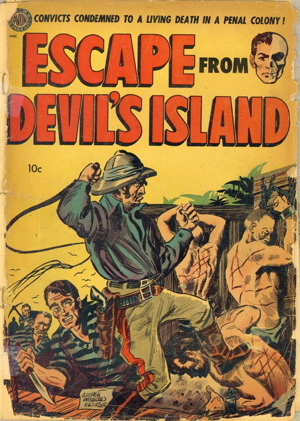
Or that this self same remoteness would provide our beloved leader Scott Morrison with another natural “gird” to wrap around us to prevent people flying in and out of the country spreading pestilence and pox. The “Tyranny of Distance” now seems to have been replaced by “the tyranny of hygiene central planners.”
At the moment, I don’t think I have ever felt more “girt” in my life and so the words of the anthem will have added meaning which its lyrcist (if we can call him that) never intended.
On being Alerted
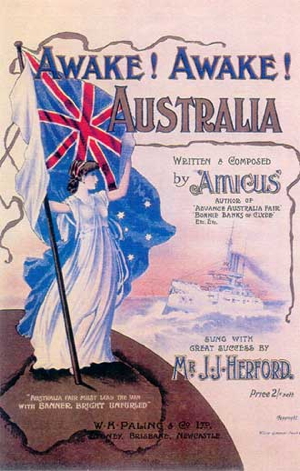
Peter Dodds McCormick wrote another patriotic song circa 1901 called “Awake! Awake, Australia!” which was a call for the new nation of Australia to come to the defence of the Empire. Britain was involved in fighting the South African Boer’s struggle for independence and McCormick thought Australian men needed to be “alerted” so they could “lead the van” in order to “keep the Empire won”.
Note also the repeated exhortations for “Australia Fair” to arise from its slumbers and to lead the fight for the Empire.
Awake! Awake, Australia!
Awake from peaceful ease!
The nations great are calling thee,
From distant lands and seas.
Thy dormant days are ended, thy hours of rest are run;
Now rouse thee, for a nation’s work,
and keep the Empire won!
Beneath thy bright blue skies,
Australia Fair, arise!
“Awake! Awake, Australia!”
Old Father Neptune cries,
“My children have to Manhood grown,
beneath the southern skies;
My northern sons have led you,
brave, darling me of old.
Now southern seas, bring forth your men
of worth and courage bold!”
Beneath thy bright blue skies,
Australia Fair, arise!
Awake! Awake, Australia!
Old Britain’s bracing cheer
Is borne across the waters far,
and all her children hear.
The echoes are reply-ing
from climes o’er all the world
Australia fair must lead the van,
with banner bright unfurled!
Beneath thy bright blue skies,
Australia Fair, arise!
I wonder how Scott Morrison would change some of these lyrics to make it more politically correct. Might I suggest making it more gender inclusive as I don’t think it right for only the men (manhood, sons) to do the fighting for “God, King, and Country”. Australian women also need to be “alerted” to do their patriotic duty.
On being Skirted
While we argue about what to call “the 26th of January” or when in fact we should have “the 26th January”, or if we should have a “26th of January” at all, most people seem to “skirt” around the issue of convictism. Scott Morrison, bless his soul, tried to rise this issue last week and got blasted out of the water by suggesting that it wasn’t much fun for the soldiers and convicts on board the First Fleet “Scott Morrison criticised for saying 26 January ‘wasn’t a flash day for those on first fleet vessels either’”. It would have been more historically accurate to have mentioned the Second Fleet which came the following year and suffered horrendous casualties en route (25% died) and a further 20% died in the immediate months after landing.
A very large spotted gum next door came crashing down early on Boxing Day morning, crushing 2 parked cars, and causing considerable alarm. I tell you this because one of the “arborists” who came to clear up the debris told me that his ancestor had arrived on the Second Fleet, which is why I got to reading about it. I asked myself if there had been a “Last Fleet” and if so, would they have called it that? Probably not. And do the descendants of the 2nd, 3rd, and nth fleets gather around the BBQ on Australia Day and boast about their family’s heritage. Again, probably not.
As a side note, in the Third Fleet of 1791 (was this the last of the “numbered” fleets to arrive in Sydney?) it is important to note that one of the vessels, the Mary Ann, had a much needed “cargo” of women, who were in short supply in the male-dominated prison. Ever since, historians have been arguing whether in fact the “Mary Ann” was the last ship to arrive of the Second Fleet, or the first in the Third Fleet. I’m not sure this bothered the women cargo as much.
The hyper-nationalism of some conservative groups makes the historian in me want to point out the fact, which they like to “skirt”, that the colony in Sydney was a military run penal colony which had most of the features of a centrally planned socialist economy, with coerced labour, a government controlled and regulated “public stores” system for the distribution of essential goods, a barely functioning or even non-existent free market, bans on liquor consumption, controls on what could be produced (to satisfy the requirement of the East India Company monopolies in the region), the leasing of land to favoured individuals, and so on. Thus, the early decades of the colony were hardly the beacon of private property, free market capitalism, and democracy which some conservatives today would like to think. Some of these things might come later, but not for several decades of experiment and failure with military central planning of the economy. On “the 26th of January” this is what comes to my mind not the sunnier “for we are young and free”.
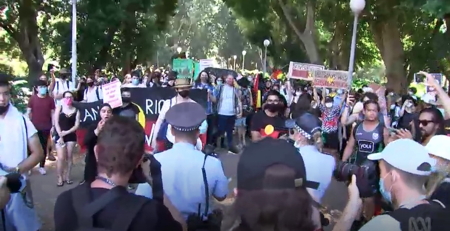
Four arrested in Sydney’s Hyde Park after peaceful Invasion Day protest at The Domain – ABC News
Given the convict and military socialist origins of the colony in Sydney it seems more than fitting that police on “Australia Day” would arrest and possibly imprison protesters for not maintaining the required “social distancing” in a public place. (By the way, shouldn’t this be called “anti-social distancing”?) Perhaps in solidarity with the founders of the colony (or should we rather call them “inmates”) we should all attempt to get arrested by engaging in acts of civil (or even uncivil) disobedience. We could then protest “Incarceration Day” as well as “Invasion Day”.
Maybe next year.
